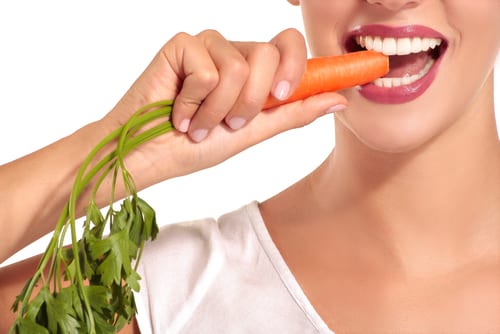While regular brushing, flossing, and dental check-ups are fundamental to maintaining a healthy smile, your diet also plays a significant role. The foods and drinks you consume can directly affect your oral health, either positively or negatively. This article delves into the role of diet in maintaining optimal oral health and offers tips for making tooth-friendly dietary choices.

Understanding the Connection Between Diet and Oral Health
Every time you eat or drink something, you’re not just feeding yourself; you’re feeding the bacteria that live in your mouth as well. These bacteria produce acids that can attack your teeth and lead to tooth decay. Foods high in sugars and carbohydrates can stimulate more acid production, while those rich in certain nutrients can help protect your teeth.
Foods That Promote Oral Health
Dairy Products
Dairy products like milk, cheese, and yogurt are high in calcium and protein, essential for healthy teeth. They also raise the pH level in your mouth, which can help fight tooth decay.
Crunchy Fruits and Vegetables
Crunchy fruits and vegetables like apples, carrots, and celery are not only nutritious but also act as natural toothbrushes. Their crunchiness helps scrub away plaque and food particles, while their high water content stimulates saliva production, nature’s way of keeping your mouth clean.
Green Tea
Green tea contains compounds called catechins that can kill the bacteria in your mouth, reducing your risk of gum disease and tooth decay. Plus, green tea doesn’t erode enamel like many other beverages.
Foods to Limit for Better Oral Health
Sugary Foods and Drinks
Sugar is a major enemy of your teeth as it fuels bacteria and increases acid production. Try to limit your intake of sugary foods and drinks, including candies, cookies, sodas, and fruit juices.
Acidic Foods and Drinks
Acidic foods and drinks like citrus fruits, tomatoes, coffee, and wine can erode tooth enamel over time, making your teeth more susceptible to decay.
Starchy Foods
Starchy foods like bread, pasta, and chips can easily get stuck in your teeth, providing a feast for bacteria and leading to plaque buildup.
The Importance of Hydration
Staying hydrated is crucial for your oral health. Water helps wash away food particles and neutralize acids, protecting your teeth from decay. It also aids in saliva production, which contains minerals and proteins that further protect tooth enamel.
How Meal Timing Affects Oral Health
Not just what you eat but when you eat it can impact your oral health. Constantly snacking or sipping sugary drinks throughout the day gives bacteria more opportunities to produce acids. Try to stick to defined mealtimes and choose tooth-friendly snacks like nuts and cheese if you need to eat between meals.
Your diet plays an integral role in maintaining optimal oral health. By making mindful choices about what and when you eat, you can help protect your teeth and gums from damage, ensuring a healthier, brighter smile. Remember, though, that diet is just one piece of the oral health puzzle. Regular brushing, flossing, and dental check-ups are equally important.
Schedule Your Next Appointment!
Ready to take the next step toward optimal oral health? Schedule your next dental visit today and discuss your diet and oral health with our experienced dental professionals. We’re committed to helping you understand the connection between what you eat and the health of your teeth and gums, empowering you to make the best choices for your oral health.